|
PRINT Version

Magna Carta
Surety Baron
Ancestors
PRINT Version
of this article
Link to
The National Society
Magna Charta Dames
and Barons
Back to


|
INTRODUCTION
On the 15th
of June, 1215, King John met his Barons on the field of
Runnemede, the ancient meadow of council. His followers were
few as he met more than two thousand Knights and Barons in arms
encamped on the field. The Barons had sworn an oath that they
would compel the King to confirm their liberties or they would
wage war against him to the death. Theirs was a holy crusade
against John to recover the liberties their forefathers had
enjoyed and to restore the good old customs violated by an
oppressive and mercenary ruler. Their demands had been
presented to the King months before for his consideration, and
before the day passed he affixed his seal to the original but
preliminary draft known as the "Articles of the Barons." The
exact terms of the Great Charter itself were decided and
engrossed during four subsequent days of negotiation, and it was
on the 19th that the great seal was affixed to all copies. These
were all dated back to the 15th of June, and duly sealed by the
King.
The Great Charter of Liberties has
become The Mother of Constitutions. The liberties of half the
civilized world are derived from the English Magna Carta. It is
recognized as the basis of our laws, and of national liberty in
general. Long standing customs, called Common Law, had now
become written law, among them, no taxation without
representation, judgment by peers, and due process of law.
Liberty is the keynote of the Charter, to have and to hold, to
them and their heirs, for ever. The King is not above the law;
the law reigns supreme.
The eight Surety
Barons profiled in this report along with King John of England
are all ancestors. The lineage from each is shown to the side
to make it easier for the reader to comprehend.
|
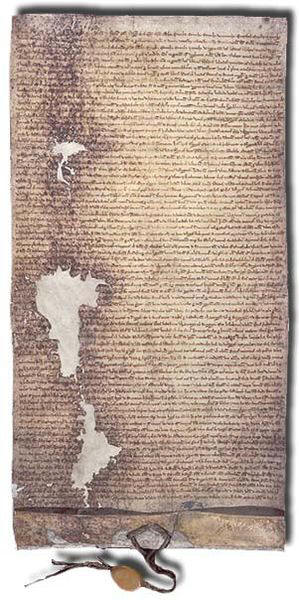
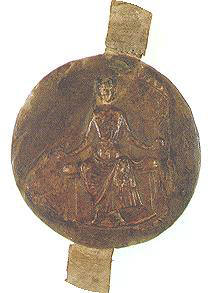
Seal of King John |
Magna Carta
(Latin for "Great
Charter", literally "Great Paper"), also called Magna
Carta Libertatum ("Great Charter of Freedoms"), is an
English charter originally issued in 1215. Magna Carta
was the most significant early influence on the long
historical process that led to the rule of
constitutional law today. Magna Carta was originally
created because of disagreements between Pope Innocent
III, King John and his English barons about the rights
of the King. Magna Carta required the king to renounce
certain rights, respect certain legal procedures and
accept that the will of the king could be bound by
law.
There are a number
of popular misconceptions about Magna Carta, such as
that it was the first document to limit the power of an
English king by law (it was not the first, and was
partly based on the Charter of Liberties); that it in
practice limited the power of the king (it mostly did
not in the Middle Ages); and that it is a single static
document (it is a variety of documents referred to under
a common name).
Magna Carta was
renewed throughout the Middle Ages, and further during
the Tudor and Stuart periods, and the 17th and 18th
centuries. By the early 19th century most clauses had
been repealed from English law. The influence of Magna
Carta outside England can be seen in the United States
Constitution and Bill of Rights. Indeed just about every
common law state has been influenced by Magna Carta,
making it one of the most important legal documents in
the history of democracy.
Events leading to Magna Carta
After the Norman
Conquest of England in 1066 and advances in the 12th
century, the English king had by 1199 become the most
powerful monarch in Europe. This was due to a number of
factors including the sophisticated centralized
government created by the procedures of the new
Anglo-Saxon systems of governance, and extensive
Anglo-Norman land holdings in Normandy. But after King
John was crowned in the early 13th century, a series of
stunning failures on his part led the barons of England
to revolt and place checks on the king's power.
France
One major cause of
discontent in the realm were John's actions in France.
At the time of John's accession to the throne after
Richard's death, there were no set rules to define the
line of succession. John, as Richard's younger brother,
was crowned over Richard's nephew, Arthur of Brittany.
As Arthur still had a claim over the Anjou empire,
however, John needed the approval of the French King,
Philip Augustus. To get it, John gave to Philip vast
tracts of the French-speaking Anjou territories. |
When John later married
Isabella of Angoulême, her previous fiancé (Hugh IX of Lusignan,
one of John's vassals) appealed to Philip, who then declared
forfeit all of John's French lands, including the rich Normandy.
Philip declared Arthur as the true ruler of the Anjou throne and
invaded John's French holdings in mid-1202 to give it to him.
John had to act to save face, but his eventual actions did not
achieve this—he ended up killing Arthur in suspicious
circumstances, thus losing the little support he had from his
French barons.
After the defeat of John's
allies at the Battle of Bouvines, Philip retained all of John's
northern French territories, including Normandy (although the
Aquitaine remained in English hands for a time). As a result,
John was revealed as a weak military leader, and one who lost to
the French a major source of income, neither of which made him
popular at home. Worse, to recoup his expenses, John would have
to further tax the already unhappy barons.
Note: John's nickname of "Lackland"
does not refer to these losses to France, but to the fact that,
unlike his elder brothers, he had received no land rights on the
continent at birth.
The Church
At the time of John’s reign
there was still a great deal of controversy as to how the
Archbishop of Canterbury was to be elected, although it had
become traditional that the monarch would appoint a candidate
with the approval of the monks of Canterbury.
But in the early 13th
century, the bishops began to want a say. To retain control, the
monks elected one of their numbers to the role. But John,
incensed at his lack of involvement in the proceedings, sent the
Bishop of Norwich to Rome as his choice. Pope Innocent III
declared both choices as invalid and persuaded the monks to
elect Stephen Langton, who in fact was probably the best choice.
But John refused to accept this choice and exiled the monks from
the realm. Infuriated, Innocent ordered an interdict (prevention
of public worship) in England in 1208, excommunicated John in
1209, and backed Philip to invade England in 1212.
John finally backed down
and agreed to endorse Langton and allow the exiles to return,
and to completely placate the pope he gave England and Ireland
as papal territories and rented them back as a fiefdom for 1,000
marks per annum. This further enraged the barons as it meant
that they had even less autonomy in their own lands.
Taxes
Despite all of this,
England's government could function without a strong king. The
efficient civil service, established by the powerful King Henry
II had run England throughout the reign of Richard I. But the
government needed money, for during this period of prosperity
mercenary soldiers cost nearly twice as much as before. The loss
of the French territories, especially Normandy, greatly reduced
the state income and a huge tax would have to be raised in order
to attempt to reclaim these territories. Yet it was difficult to
raise taxes due to the tradition of keeping them at the same
level.
Novel forms of income
included a Forest law, a set of regulations about the king’s
forest which were easily broken and severely punished. John also
increased the pre-existing scutage (feudal payment to an
overlord replacing direct military service) eleven times in his
seventeen years as king, as compared to eleven times in twice
that period covering three monarchs before him. The last two of
these increases were double the increase of their predecessors.
He also imposed the first income tax which rose, what was at the
time, the extortionate sum of £60,000.
Rebellion
and civil war
By 1215, some of the barons
of England banded together and took London by force on June 10,
1215. They and many of the fence-sitting moderates not in overt
rebellion forced King John to agree to a document called the
"Articles of the Barons", to which his Great Seal was attached
in the meadow at Runnymede on June 15, 1215. In return, the
barons renewed their oaths of fealty to King John on June 19,
1215. A formal document to record the agreement was created by
the royal chancery on July 15: this was the original Magna Carta.
An unknown number of copies of it were sent out to officials,
such as royal sheriffs and bishops.
The most significant clause
for King John at the time was clause 61, known as the "security
clause", the longest portion of the document. This established a
committee of 25 barons who could at any time meet and over-rule
the will of the King, through force by seizing his castles and
possessions if needed. This was based on a medieval legal
practice known as distraint, which was commonly done, but
it was the first time it had been applied to a monarch. In
addition, the King was to take an oath of loyalty to the
committee.
King John had no intention
to honor Magna Carta, as it was sealed under extortion by force,
and clause 61 essentially neutered his power as a monarch,
making him King in name only. He renounced it as soon as the
barons left London, plunging England into a civil war, called
the First Barons' War. Pope Innocent III also immediately
annulled the "shameful and demeaning agreement, forced upon the
king by violence and fear." He rejected any call for rights,
saying it impaired King John's dignity. He saw it as an affront
to the Church's authority over the king and released John from
his oath to obey it.
Magna Carta
re-issued
John died in the middle of
the war, from dysentery, on October 18, 1216, and this quickly
changed the nature of the war. His nine-year-old son, Henry III,
was next in line for the throne. The royalists believed the
rebel barons would find the idea of loyalty to the child Henry
more palatable, and so the child was swiftly crowned in late
October 1216 and the war ended.
Henry's regents reissued
Magna Carta in his name on November 12, 1216, omitting some
clauses, such as clause 61, and again in 1217. When he turned 18
in 1225, Henry III himself reissued Magna Carta again, this time
in a shorter version with only 37 articles.
Henry III ruled for 56
years (the longest reign of an English Monarch in the Medieval
period) so that by the time of his death in 1272, Magna Carta
had become a settled part of English legal precedent, and more
difficult for a future monarch to annul as King John had
attempted nearly three generations earlier.
Henry III's son and heir
Edward I's Parliament reissued Magna Carta for the final time on
12 October 1297 as part of a statute called Confirmatio
cartarum (25 Edw. I), reconfirming Henry III's shorter
version of Magna Carta from 1225.
Content of
Magna Carta
The Magna Carta was
originally written in Latin. A large part of Magna Carta was
copied, nearly word for word, from the Charter of Liberties of
Henry I, issued when Henry I ascended to the throne in 1100,
which bound the king to certain laws regarding the treatment of
church officials and nobles, effectively granting certain civil
liberties to the church and the English nobility.
Rights still
in force today
Clause 1 of Magna Carta
(the original 1215 edition) guarantees the freedom of the
English Church. Although this originally meant freedom from the
King, later in history it was used for different purposes.
Clause 13 guarantees the “ancient liberties” of the city of
London. Clause 39 gives a right to due process.
The 1215 edition was
annulled in 1216 but some of the 1297 version is still in force
today and preserves the rights listed above.
In 1828
the passing of the first Offences Against the Person Act, was
the first time a clause of Magna Carta was repealed, namely
Clause 36. With the document's perceived protected status
broken, in one hundred and fifty years nearly the whole charter
was repealed, leaving just Clauses 1, 13, 39, and 40 still in
force after the Statute Law (Repeals) Act was passed in 1969.
The Magna Carta
(The
Great Charter)
Preamble: John, by
the grace of God, king of England, lord of Ireland, duke of
Normandy and Aquitaine, and count of Anjou, to the
archbishop, bishops, abbots, earls, barons, justiciaries,
foresters, sheriffs, stewards, servants, and to all his
bailiffs and liege subjects, greetings. Know that, having
regard to God and for the salvation of our soul, and those
of all our ancestors and heirs, and unto the honor of God
and the advancement of his holy Church and for the
rectifying of our realm, we have granted as underwritten by
advice of our venerable fathers, Stephen, archbishop of
Canterbury, primate of all England and cardinal of the holy
Roman Church, Henry, archbishop of Dublin, William of
London, Peter of Winchester, Jocelyn of Bath and
Glastonbury, Hugh of Lincoln, Walter of Worcester, William
of Coventry, Benedict of Rochester, bishops; of Master
Pandulf, subdeacon and member of the household of our lord
the Pope, of brother Aymeric (master of the Knights of the
Temple in England), and of the illustrious men William
Marshal, earl of Pembroke, William, earl of Salisbury,
William, earl of Warenne, William, earl of Arundel, Alan of
Galloway (constable of Scotland), Waren Fitz Gerold, Peter
Fitz Herbert, Hubert De Burgh (seneschal of Poitou), Hugh de
Neville, Matthew Fitz Herbert, Thomas Basset, Alan Basset,
Philip d'Aubigny, Robert of Roppesley, John Marshal, John
Fitz Hugh, and others, our liegemen.
1.
In the first place we have granted
to God, and by this our present charter confirmed for us and
our heirs forever that the English Church shall be free, and
shall have her rights entire, and her liberties inviolate;
and we will that it be thus observed; which is apparent from
this that the freedom of elections, which is reckoned most
important and very essential to the English Church, we, of
our pure and unconstrained will, did grant, and did by our
charter confirm and did obtain the ratification of the same
from our lord, Pope Innocent III, before the quarrel arose
between us and our barons: and this we will observe, and our
will is that it be observed in good faith by our heirs
forever. We have also granted to all freemen of our kingdom,
for us and our heirs forever, all the underwritten
liberties, to be had and held by them and their heirs, of us
and our heirs forever.
2.
If any of our earls or barons, or
others holding of us in chief by military service shall have
died, and at the time of his death his heir shall be full of
age and owe "relief", he shall have his inheritance by the
old relief, to wit, the heir or heirs of an earl, for the
whole barony of an earl by £100; the heir or heirs of a
baron, £100 for a whole barony; the heir or heirs of a
knight, 100s, at most, and whoever owes less let him give
less, according to the ancient custom of fees.
3.
If, however, the heir of any one
of the aforesaid has been under age and in wardship, let him
have his inheritance without relief and without fine when he
comes of age.
4.
The guardian of the land of an
heir who is thus under age, shall take from the land of the
heir nothing but reasonable produce, reasonable customs, and
reasonable services, and that without destruction or waste
of men or goods; and if we have committed the wardship of
the lands of any such minor to the sheriff, or to any other
who is responsible to us for its issues, and he has made
destruction or waster of what he holds in wardship, we will
take of him amends, and the land shall be committed to two
lawful and discreet men of that fee, who shall be
responsible for the issues to us or to him to whom we shall
assign them; and if we have given or sold the wardship of
any such land to anyone and he has therein made destruction
or waste, he shall lose that wardship, and it shall be
transferred to two lawful and discreet men of that fief, who
shall be responsible to us in like manner as aforesaid.
5.
The guardian, moreover, so long as
he has the wardship of the land, shall keep up the houses,
parks, fishponds, stanks, mills, and other things pertaining
to the land, out of the issues of the same land; and he
shall restore to the heir, when he has come to full age, all
his land, stocked with ploughs and wainage, according as the
season of husbandry shall require, and the issues of the
land can reasonable bear.
6.
Heirs shall be married without
disparagement, yet so that before the marriage takes place
the nearest in blood to that heir shall have notice.
7.
A widow, after the death of her
husband, shall forthwith and without difficulty have her
marriage portion and inheritance; nor shall she give
anything for her dower, or for her marriage portion, or for
the inheritance which her husband and she held on the day of
the death of that husband; and she may remain in the house
of her husband for forty days after his death, within which
time her dower shall be assigned to her.
8.
No widow shall be compelled to
marry, so long as she prefers to live without a husband;
provided always that she gives security not to marry without
our consent, if she holds of us, or without the consent of
the lord of whom she holds, if she holds of another.
9.
Neither we nor our bailiffs will
seize any land or rent for any debt, as long as the chattels
of the debtor are sufficient to repay the debt; nor shall
the sureties of the debtor be distrained so long as the
principal debtor is able to satisfy the debt; and if the
principal debtor shall fail to pay the debt, having nothing
wherewith to pay it, then the sureties shall answer for the
debt; and let them have the lands and rents of the debtor,
if they desire them, until they are indemnified for the debt
which they have paid for him, unless the principal debtor
can show proof that he is discharged thereof as against the
said sureties.
10.
If one who has borrowed from the
Jews any sum, great or small, die before that loan be
repaid, the debt shall not bear interest while the heir is
under age, of whomsoever he may hold; and if the debt fall
into our hands, we will not take anything except the
principal sum contained in the bond.
11.
And if anyone die indebted to the
Jews, his wife shall have her dower and pay nothing of that
debt; and if any children of the deceased are left under
age, necessaries shall be provided for them in keeping with
the holding of the deceased; and out of the residue the debt
shall be paid, reserving, however, service due to feudal
lords; in like manner let it be done touching debts due to
others than Jews.
12.
No scutage not aid shall be
imposed on our kingdom, unless by common counsel of our
kingdom, except for ransoming our person, for making our
eldest son a knight, and for once marrying our eldest
daughter; and for these there shall not be levied more than
a reasonable aid. In like manner it shall be done concerning
aids from the city of London.
13.
And the city of London shall have
all it ancient liberties and free customs, as well by land
as by water; furthermore, we decree and grant that all other
cities, boroughs, towns, and ports shall have all their
liberties and free customs.
14.
And for obtaining the common
counsel of the kingdom anent the assessing of an aid (except
in the three cases aforesaid) or of a scutage, we will cause
to be summoned the archbishops, bishops, abbots, earls, and
greater barons, severally by our letters; and we will
moveover cause to be summoned generally, through our
sheriffs and bailiffs, and others who hold of us in chief,
for a fixed date, namely, after the expiry of at least forty
days, and at a fixed place; and in all letters of such
summons we will specify the reason of the summons. And when
the summons has thus been made, the business shall proceed
on the day appointed, according to the counsel of such as
are present, although not all who were summoned have come.
15.
We will not for the future grant
to anyone license to take an aid from his own free tenants,
except to ransom his person, to make his eldest son a
knight, and once to marry his eldest daughter; and on each
of these occasions there shall be levied only a reasonable
aid.
16.
No one shall be distrained for
performance of greater service for a knight's fee, or for
any other free tenement, than is due therefrom.
17.
Common pleas shall not follow our
court, but shall be held in some fixed place.
18.
Inquests of novel disseisin, of
mort d'ancestor, and of darrein presentment shall not be
held elsewhere than in their own county courts, and that in
manner following; We, or, if we should be out of the realm,
our chief justiciar, will send two justiciaries through
every county four times a year, who shall alone with four
knights of the county chosen by the county, hold the said
assizes in the county court, on the day and in the place of
meeting of that court.
19.
And if any of the said assizes
cannot be taken on the day of the county court, let there
remain of the knights and freeholders, who were present at
the county court on that day, as many as may be required for
the efficient making of judgments, according as the business
be more or less.
20.
A freeman shall not be amerced for
a slight offense, except in accordance with the degree of
the offense; and for a grave offense he shall be amerced in
accordance with the gravity of the offense, yet saving
always his "contentment"; and a merchant in the same way,
saving his "merchandise"; and a villein shall be amerced in
the same way, saving his "wainage" if they have fallen into
our mercy: and none of the aforesaid amercements shall be
imposed except by the oath of honest men of the
neighborhood.
21.
Earls and barons shall not be
amerced except through their peers, and only in accordance
with the degree of the offense.
22.
A clerk shall not be amerced in
respect of his lay holding except after the manner of the
others aforesaid; further, he shall not be amerced in
accordance with the extent of his ecclesiastical benefice.
23.
No village or individual shall be
compelled to make bridges at river banks, except those who
from of old were legally bound to do so.
24.
No sheriff, constable, coroners,
or others of our bailiffs, shall hold pleas of our Crown.
25.
All counties, hundred, wapentakes,
and trithings (except our demesne manors) shall remain at
the old rents, and without any additional payment.
26.
If anyone holding of us a lay fief
shall die, and our sheriff or bailiff shall exhibit our
letters patent of summons for a debt which the deceased owed
us, it shall be lawful for our sheriff or bailiff to attach
and enroll the chattels of the deceased, found upon the lay
fief, to the value of that debt, at the sight of law worthy
men, provided always that nothing whatever be thence removed
until the debt which is evident shall be fully paid to us;
and the residue shall be left to the executors to fulfill
the will of the deceased; and if there be nothing due from
him to us, all the chattels shall go to the deceased, saving
to his wife and children their reasonable shares.
27.
If any freeman shall die
intestate, his chattels shall be distributed by the hands of
his nearest kinsfolk and friends, under supervision of the
Church, saving to every one the debts which the deceased
owed to him.
28.
No constable or other bailiff of
ours shall take corn or other provisions from anyone without
immediately tendering money therefor, unless he can have
postponement thereof by permission of the seller.
29.
No constable shall compel any
knight to give money in lieu of castle-guard, when he is
willing to perform it in his own person, or (if he himself
cannot do it from any reasonable cause) then by another
responsible man. Further, if we have led or sent him upon
military service, he shall be relieved from guard in
proportion to the time during which he has been on service
because of us.
30.
No sheriff or bailiff of ours, or
other person, shall take the horses or carts of any freeman
for transport duty, against the will of the said freeman.
31.
Neither we nor our bailiffs shall
take, for our castles or for any other work of ours, wood
which is not ours, against the will of the owner of that
wood.
32.
We will not retain beyond one year
and one day, the lands those who have been convicted of
felony, and the lands shall thereafter be handed over to the
lords of the fiefs.
33.
All kydells for the future shall
be removed altogether from Thames and Medway, and throughout
all England, except upon the seashore.
34.
The writ which is called praecipe
shall not for the future be issued to anyone, regarding any
tenement whereby a freeman may lose his court.
35.
Let there be one measure of wine
throughout our whole realm; and one measure of ale; and one
measure of corn, to wit, "the London quarter"; and one width
of cloth (whether dyed, or russet, or "halberget"), to wit,
two ells within the selvedges; of weights also let it be as
of measures.
36.
Nothing in future shall be given
or taken for a writ of inquisition of life or limbs, but
freely it shall be granted, and never denied.
37.
If anyone holds of us by fee-farm,
either by socage or by burage, or of any other land by
knight's service, we will not (by reason of that fee-farm,
socage, or burgage), have the wardship of the heir, or of
such land of his as if of the fief of that other; nor shall
we have wardship of that fee-farm, socage, or burgage,
unless such fee-farm owes knight's service. We will not by
reason of any small serjeancy which anyone may hold of us by
the service of rendering to us knives, arrows, or the like,
have wardship of his heir or of the land which he holds of
another lord by knight's service.
38.
No bailiff for the future shall,
upon his own unsupported complaint, put anyone to his "law",
without credible witnesses brought for this purposes.
39.
No freemen shall be taken or
imprisoned or disseised or exiled or in any way destroyed,
nor will we go upon him nor send upon him, except by the
lawful judgment of his peers or by the law of the land.
40.
To no one will we sell, to no one
will we refuse or delay, right or justice.
41.
All merchants shall have safe and
secure exit from England, and entry to England, with the
right to tarry there and to move about as well by land as by
water, for buying and selling by the ancient and right
customs, quit from all evil tolls, except (in time of war)
such merchants as are of the land at war with us. And if
such are found in our land at the beginning of the war, they
shall be detained, without injury to their bodies or goods,
until information be received by us, or by our chief
justiciar, how the merchants of our land found in the land
at war with us are treated; and if our men are safe there,
the others shall be safe in our land.
42.
It shall be lawful in future for
anyone (excepting always those imprisoned or outlawed in
accordance with the law of the kingdom, and natives of any
country at war with us, and merchants, who shall be treated
as if above provided) to leave our kingdom and to return,
safe and secure by land and water, except for a short period
in time of war, on grounds of public policy- reserving
always the allegiance due to us.
43.
If anyone holding of some escheat
(such as the honor of Wallingford, Nottingham, Boulogne,
Lancaster, or of other escheats which are in our hands and
are baronies) shall die, his heir shall give no other
relief, and perform no other service to us than he would
have done to the baron if that barony had been in the
baron's hand; and we shall hold it in the same manner in
which the baron held it.
44.
Men who dwell without the forest
need not henceforth come before our justiciaries of the
forest upon a general summons, unless they are in plea, or
sureties of one or more, who are attached for the forest.
45.
We will appoint as justices,
constables, sheriffs, or bailiffs only such as know the law
of the realm and mean to observe it well.
46.
All barons who have founded
abbeys, concerning which they hold charters from the kings
of England, or of which they have long continued possession,
shall have the wardship of them, when vacant, as they ought
to have.
47.
All forests that have been made
such in our time shall forthwith be disafforsted; and a
similar course shall be followed with regard to river banks
that have been placed "in defense" by us in our time.
48.
All evil customs connected with
forests and warrens, foresters and warreners, sheriffs and
their officers, river banks and their wardens, shall
immediately by inquired into in each county by twelve sworn
knights of the same county chosen by the honest men of the
same county, and shall, within forty days of the said
inquest, be utterly abolished, so as never to be restored,
provided always that we previously have intimation thereof,
or our justiciar, if we should not be in England.
49.
We will immediately restore all
hostages and charters delivered to us by Englishmen, as
sureties of the peace of faithful service.
50.
We will entirely remove from their
bailiwicks, the relations of Gerard of Athee (so that in
future they shall have no bailiwick in England); namely,
Engelard of Cigogne, Peter, Guy, and Andrew of Chanceaux,
Guy of Cigogne, Geoffrey of Martigny with his brothers,
Philip Mark with his brothers and his nephew Geoffrey, and
the whole brood of the same.
51.
As soon as peace is restored, we
will banish from the kingdom all foreign born knights,
crossbowmen, serjeants, and mercenary soldiers who have come
with horses and arms to the kingdom's hurt.
52.
If anyone has been dispossessed or
removed by us, without the legal judgment of his peers, from
his lands, castles, franchises, or from his right, we will
immediately restore them to him; and if a dispute arise over
this, then let it be decided by the five and twenty barons
of whom mention is made below in the clause for securing the
peace. Moreover, for all those possessions, from which
anyone has, without the lawful judgment of his peers, been
disseised or removed, by our father, King Henry, or by our
brother, King Richard, and which we retain in our hand (or
which as possessed by others, to whom we are bound to
warrant them) we shall have respite until the usual term of
crusaders; excepting those things about which a plea has
been raised, or an inquest made by our order, before our
taking of the cross; but as soon as we return from the
expedition, we will immediately grant full justice therein.
53.
We shall have, moreover, the same
respite and in the same manner in rendering justice
concerning the disafforestation or retention of those
forests which Henry our father and Richard our broter
afforested, and concerning the wardship of lands which are
of the fief of another (namely, such wardships as we have
hitherto had by reason of a fief which anyone held of us by
knight's service), and concerning abbeys founded on other
fiefs than our own, in which the lord of the fee claims to
have right; and when we have returned, or if we desist from
our expedition, we will immediately grant full justice to
all who complain of such things.
54.
No one shall be arrested or
imprisoned upon the appeal of a woman, for the death of any
other than her husband.
55.
All fines made with us unjustly
and against the law of the land, and all amercements,
imposed unjustly and against the law of the land, shall be
entirely remitted, or else it shall be done concerning them
according to the decision of the five and twenty barons whom
mention is made below in the clause for securing the pease,
or according to the judgment of the majority of the same,
along with the aforesaid Stephen, archbishop of Canterbury,
if he can be present, and such others as he may wish to
bring with him for this purpose, and if he cannot be present
the business shall nevertheless proceed without him,
provided always that if any one or more of the aforesaid
five and twenty barons are in a similar suit, they shall be
removed as far as concerns this particular judgment, others
being substituted in their places after having been selected
by the rest of the same five and twenty for this purpose
only, and after having been sworn.
56.
If we have disseised or removed
Welshmen from lands or liberties, or other things, without
the legal judgment of their peers in England or in Wales,
they shall be immediately restored to them; and if a dispute
arise over this, then let it be decided in the marches by
the judgment of their peers; for the tenements in England
according to the law of England, for tenements in Wales
according to the law of Wales, and for tenements in the
marches according to the law of the marches. Welshmen shall
do the same to us and ours.
57.
Further, for all those possessions
from which any Welshman has, without the lawful judgment of
his peers, been disseised or removed by King Henry our
father, or King Richard our brother, and which we retain in
our hand (or which are possessed by others, and which we
ought to warrant), we will have respite until the usual term
of crusaders; excepting those things about which a plea has
been raised or an inquest made by our order before we took
the cross; but as soon as we return (or if perchance we
desist from our expedition), we will immediately grant full
justice in accordance with the laws of the Welsh and in
relation to the foresaid regions.
58.
We will immediately give up the
son of Llywelyn and all the hostages of Wales, and the
charters delivered to us as security for the peace.
59.
We will do towards Alexander, king
of Scots, concerning the return of his sisters and his
hostages, and concerning his franchises, and his right, in
the same manner as we shall do towards our owher barons of
England, unless it ought to be otherwise according to the
charters which we hold from William his father, formerly
king of Scots; and this shall be according to the judgment
of his peers in our court.
60.
Moreover, all these aforesaid
customs and liberties, the observances of which we have
granted in our kingdom as far as pertains to us towards our
men, shall be observed b all of our kingdom, as well clergy
as laymen, as far as pertains to them towards their men.
61.
Since, moreover, for God and the
amendment of our kingdom and for the better allaying of the
quarrel that has arisen between us and our barons, we have
granted all these concessions, desirous that they should
enjoy them in complete and firm endurance forever, we give
and grant to them the underwritten security, namely, that
the barons choose five and twenty barons of the kingdom,
whomsoever they will, who shall be bound with all their
might, to observe and hold, and cause to be observed, the
peace and liberties we have granted and confirmed to them by
this our present Charter, so that if we, or our justiciar,
or our bailiffs or any one of our officers, shall in
anything be at fault towards anyone, or shall have broken
any one of the articles of this peace or of this security,
and the offense be notified to four barons of the foresaid
five and twenty, the said four barons shall repair to us (or
our justiciar, if we are out of the realm) and, laying the
transgression before us, petition to have that transgression
redressed without delay. And if we shall not have corrected
the transgression (or, in the event of our being out of the
realm, if our justiciar shall not have corrected it) within
forty days, reckoning from the time it has been intimated to
us (or to our justiciar, if we should be out of the realm),
the four barons aforesaid shall refer that matter to the
rest of the five and twenty barons, and those five and
twenty barons shall, together with the community of the
whole realm, distrain and distress us in all possible ways,
namely, by seizing our castles, lands, possessions, and in
any other way they can, until redress has been obtained as
they deem fit, saving harmless our own person, and the
persons of our queen and children; and when redress has been
obtained, they shall resume their old relations towards us.
And let whoever in the country desires it, swear to obey the
orders of the said five and twenty barons for the execution
of all the aforesaid matters, and along with them, to molest
us to the utmost of his power; and we publicly and freely
grant leave to everyone who wishes to swear, and we shall
never forbid anyone to swear. All those, moreover, in the
land who of themselves and of their own accord are unwilling
to swear to the twenty five to help them in constraining and
molesting us, we shall by our command compel the same to
swear to the effect foresaid. And if any one of the five and
twenty barons shall have died or departed from the land, or
be incapacitated in any other manner which would prevent the
foresaid provisions being carried out, those of the said
twenty five barons who are left shall choose another in his
place according to their own judgment, and he shall be sworn
in the same way as the others. Further, in all matters, the
execution of which is entrusted, to these twenty five
barons, if perchance these twenty five are present and
disagree about anything, or if some of them, after being
summoned, are unwilling or unable to be present, that which
the majority of those present ordain or command shall be
held as fixed and established, exactly as if the whole
twenty five had concurred in this; and the said twenty five
shall swear that they will faithfully observe all that is
aforesaid, and cause it to be observed with all their might.
And we shall procure nothing from anyone, directly or
indirectly, whereby any part of these concessions and
liberties might be revoked or diminished; and if any such
things has been procured, let it be void and null, and we
shall never use it personally or by another.
62.
And all the will, hatreds, and
bitterness that have arisen between us and our men, clergy
and lay, from the date of the quarrel, we have completely
remitted and pardoned to everyone. Moreover, all trespasses
occasioned by the said quarrel, from Easter in the sixteenth
year of our reign till the restoration of peace, we have
fully remitted to all, both clergy and laymen, and
completely forgiven, as far as pertains to us. And on this
head, we have caused to be made for them letters testimonial
patent of the lord Stephen, archbishop of Canterbury, of the
lord Henry, archbishop of Dublin, of the bishops aforesaid,
and of Master Pandulf as touching this security and the
concessions aforesaid.
63.
Wherefore we will and firmly order
that the English Church be free, and that the men in our
kingdom have and hold all the aforesaid liberties, rights,
and concessions, well and peaceably, freely and quietly,
fully and wholly, for themselves and their heirs, of us and
our heirs, in all respects and in all places forever, as is
aforesaid. An oath, moreover, has been taken, as well on our
part as on the art of the barons, that all these conditions
aforesaid shall be kept in good faith and without evil
intent.
Given under our hand - the
above named and many others being witnesses - in the meadow
which is called Runnymede, between Windsor and Staines, on the
fifteenth day of June, in the seventeenth year of our reign.
|
Participant list
Barons, Bishops and
Abbots who were party to Magna Carta.
Barons
Surety Barons for
the enforcement of Magna Carta (ancestors shown in
Green).
A surety is a person who agrees to be responsible for
the debt or obligation of another.
-
William
d'Albini, Lord of Belvoir Castle.
-
Roger Bigod,
Earl of Norfolk and Suffolk.
-
Hugh Bigod,
Heir to the Earldoms of Norfolk and Suffolk.
-
Henry de Bohun,
Earl of Hereford.
-
Richard de
Clare,
Earl of Hertford.
-
Gilbert de
Clare,
heir to the earldom of Hertford.
-
John FitzRobert,
Lord of Warkworth Castle.
-
Robert
Fitzwalter, Lord of Dunmow Castle.
-
William de
Fortibus, Earl of Albemarle.
-
William Hardell,
Mayor of the City of London.
-
William de
Huntingfield, Sheriff of Norfolk and Suffolk.
-
John de Lacie,
Lord of Pontefract Castle.
-
William de
Lanvallei, Lord of Standway Castle.
-
William Malet,
Sheriff of Somerset and Dorset.
-
Geoffrey de
Mandeville, Earl of Essex and Gloucester.
-
William
Marshall jr, heir to the earldom of Pembroke.
-
Roger de
Montbegon, Lord of Hornby Castle.
-
Richard de
Montfichet, Baron.
-
William de
Mowbray, Lord of Axholme Castle.
-
Richard de
Percy, Baron.
-
Saire/Saher de
Quincey, Earl of Winchester.
-
Robert de Roos,
Lord of Hamlake Castle.
-
Geoffrey de
Saye,
Baron.
-
Robert de Vere,
heir to the earldom of Oxford.
-
Eustace de Vesci, Lord of Alnwick Castle
|
Bishops
These bishops being
witnesses (mentioned by the King as his advisers in the
decision to sign the Charter):
-
Stephen
Langton, Archbishop of Canterbury, Cardinal of the
Holy Roman Church,
-
Henry,
Archbishop of Dublin
-
E. Bishop of
London,
-
J. Bishop of
Bath,
-
P. Bishop of
Winchester,
-
H. Bishop of
Lincoln,
-
R. Bishop of
Salisbury,
-
W. Bishop of
Rochester,
-
W. Bishop of
Worcester,
-
J. Bishop of
Ely,
-
H. Bishop of
Hereford,
-
R. Bishop of
Chichester,
-
W. Bishop of
Exeter.
Abbots
These abbots being
witnesses:
-
the Abbot of
St. Edmunds
-
the Abbot of
St. Albans
-
the Abbot of
Bello
-
the Abbot of
St. Augustines in Canterbury
-
the Abbot of
Evesham
-
the Abbot of
Westminster
-
the Abbot of
Peterborough
-
the Abbot of
Reading
-
the Abbot of
Abingdon
-
the Abbot of
Malmesbury Abbey
-
the Abbot of
Winchcomb
-
the Abbot of
Hyde
-
the Abbot of
Certesey
-
the Abbot of
Sherborne
-
the Abbot of
Cerne
-
the Abbot of
Abbotebir
-
the Abbot of
Middleton
-
the Abbot of
Selby
-
the Abbot of
Cirencester
Others
|
Our Magna Carta Surety Baron Ancestors
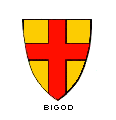
Roger Bigod
(c.
1150
–
1221),
was the son of
Hugh Bigod,
1st Earl of Norfolk and succeeded to the
earldom of
Norfolk in 1189, was confirmed in his earldom and
other honors by
Richard I,
for his claim had been disputed by his step-mother in the reign
of
Henry II.
King Richard also sent him to France as an ambassador in 1189.
Bigod is the name associated with Framlingham
Castle in Suffolk. It is an imposing structure. The outer walls
are forty-four feet high and eight feet thick. Thirteen towers
fifty-eight feet in height remain, along with a gateway and some
outworks. In early Roman times it was probably the site of the
fortified earthwork that sheltered Saint Edmund when he fled
from the Danes in 870, but we cannot be sure of the authenticity
of this tradition. The Danes seized the fort, but they lost it
in 921; it then remained a Crown possession, which passed into
the hands of William the Conqueror when he became King. In 1100
Henry I granted the Castle to Roger Bigod, and possibly Roger
was the one to erect the first masonry building. The ruins
indicate a 12th Century dating, though material from an older
building may very well have been used in the walls. Evidently
the Castle was completely rebuilt in 1170. It remained in the
Bigod family for some generations then passed into the hands of
the Mowbrays.
Earl of Norfolk is a title
which has been created several times in the Peerage of England.
Created in 1070, the first major dynasty to hold the title was
the 12th and 13th century Bigod family, and it then was later
held by the Mowbrays, who were also made Dukes of Norfolk. Due
to the Bigod's descent in the female line from William Marshal,
they inherited the hereditary office of Earl Marshal, still held
by the Dukes of Norfolk today. The present title was created in
1644 for Thomas Howard, 18th Earl of Arundel, the heir of the
Howard Dukedom of Norfolk which had been forfeit in 1572.
Arundel's grandson, the 20th Earl of Arundel and 3rd Earl of
Norfolk, was restored to the Dukedom as 5th Duke upon the
Restoration in 1660, and the title continues to be borne by the
Dukes of Norfolk.
He took part in the
negotiations for the release of Richard from prison, and after
the king's return to England became justiciar. Roger
Bigod was chosen to be one of the four Earls who carried the
silken canopy for the King, as Hugh Bigod had borne the Royal
scepter in the Royal procession.
Around Christmas
1181,
Roger married Ida de Tosney, a former mistress of King
Henry II,
and by her had a number of children, including:
-
Hugh
Bigod
-
William Bigod
-
Roger Bigod
-
John
Bigod
-
Ralph Bigod
-
Margaret Bigod
-
Mary
Bigod
-
da
Bigod
Roger Bigod was appointed in
1189 by King Richard one of the Ambassadors to King Philip of
France, to obtain aid for the recovery of the Holy Land. In 1191
he was keeper of Hereford Castle. He was chief judge in the
King's Court from 1195 to 1202. In 120() he was sent by King
John as one of his messengers to summon William the Lion, King
of Scotland, to do homage to him in the Parliament which was
held at Lincoln, and subsequently attended King John into
Poitou; but on his
return he was won over
to the opposition by the rebel Barons and became one of the
strongest advocates of the Charter of Liberty, for which he was
excommunicated by Pope Innocent III. He died before August
1221, having married as his first wife, Isabella daughter of
Hameline Plantagenet, who was descended from the Earls of
Warren.
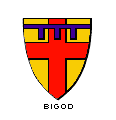
Hugh Bigod
(c. 1182-1225)
was the eldest son of
Roger Bigod,
2nd Earl of Norfolk, and for a short time the 3rd
earl of
Norfolk. In 1215 he was one of the 25 sureties of
Magna Carta
of
King John.
He succeeded to his father’s estates (including
Framlingham
Castle) in
1221
but died in his early forties in 1225.
In late 1206 or early 1207,
Hugh was married to Maud Marshal (d.1248),
daughter of Sir
William
Marshal, 1st Earl of Pembroke. Together they had the
following children:
-
Roger
Bigod, 4th Earl of Norfolk, born c.1209.
-
Hugh Bigod,
justiciar of England.
-
Isabella Bigod
-
Ralph Bigod.
-
Simon Bigod died Bef. 1242(per Ancestral Roots of Certain
American Colonists Who Came to America Before 1700 by
Frederick Lewis Weis, Line 232-29)
Very
soon after Hugh's death, Maud married
William de
Warenne, 6th Earl of Surrey.
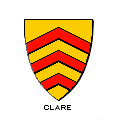
Richard de Clare,
4th Earl of
Hertford (1162 – December 30, 1218) was the son of Roger
de Clare, 3rd Earl of Hertford and Maud de St. Hilary. More
commonly known as the Earl of Clare, he had the moiety of the
Giffard estates from his ancestor Rohese. He was present at the
coronation of King Richard I at Westminster, 3 Sep 1189, and
King John on 27 May 1199. He was also present at the homage of
King William of Scotland at Lincoln.
Hertford Castle of the
de Clares is one of two Castles: A 10th Century ruin or a 17th
Century structure. The older Castle retains a wall and part of a
Norman tower. The remainder of the building is a Jacobean
accretion made of brick and completely modernized.
He married (ca. 1172) Amice Fitz William, Countess of Gloucester
(ca. 1160-1220), second daughter of William Fitz Robert, 2nd
Earl of Gloucester, and Hawise de Beaumont. He sided with the
Barons against King John, even though he had previously sworn
peace with the King at Northampton, and his castle of Tonbridge
was taken. He played a leading part in the negotiations for
Magna Carta, being one of the twenty five Barons appointed as
guardians. On 9 Nov 1215, he was one of the commissioners on the
part of the Barons to negotiate the peace with the King. In
1215, his lands in counties Cambridge, Norfolk, Suffolk and
Essex were granted to Robert de Betun. He and his son were among
the Barons excommunicated by the Pope in 1215. Sometime before
1198 Earl Richard and his wife Amice were ordered to separate by
the Pope on grounds of consanguinity. They separated for a time
because of this order but apparently they reconciled their
marriage with the Pope later on.

Gilbert de Clare,
5th Earl of
Hertford (1180 – October 25, 1230) was the son of Richard de
Clare, 4th Earl of Hertford, from whom he inherited the Clare
estates, from his mother, Amice Fitz Robert, the estates of
Gloucester and the honor of St. Hilary, and from Rohese, an
ancestor, the moiety of the Giffard estates. In June 1202, he
was entrusted with the lands of Harfleur and Montrevillers.
Gilbert de Clare built a
Castle at Caerdigan, Pembrokeshire, Wales. A marriage brought it
into the hands of William Marshall, who soon controlled the
strongest castles on the peninsula. The keep has been
transformed into a modern house. Of all the castles that finally
came into William Marshall's possession, this was the most
important to the area. Scholars believe there is evidence that
it was originally built of wood.
In 1215
Gilbert and his father were two of the barons made Magna Carta
sureties and championed Louis "le Dauphin" of France in the
First Barons' War, fighting at Lincoln under the baronial
banner. He was taken prisoner in 1217 by William Marshal, whose
daughter Isabella he later married. In 1223 he accompanied his
brother-in-law, Earl Marshal in an expedition into Wales. In
1225 he was present at the confirmation of the Magna Carta by
Henry III. In 1228 he led an army against the Welsh, capturing
Morgan Gam, who was released the next year. He then joined in an
expedition to Brittany, but died on his way back to Penrose in
that duchy. His body was conveyed home by way of Plymouth and
Cranbourgh to Tewkesbury. His widow Isabel later married Richard
Plantagenet, Earl of Cornwall & King of the Romans.
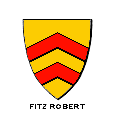
John FitzRobert married Ada
Baliol and in her right became lord of Barnard Castle whose
founder was Barnard Baliol. The Castle is now a scanty ruin, but
the remaining walls stand high on a cliff scarped, so that wall
and bank are one, dropping down to the River Tees. The Castle
looms over the town, and may be approached through a gate in the
yard of the King's Head Inn.
The date of the Castle's
founding is between 1112 and 1132. The keep, known as Baliol's
Tower, stands fifty feet high and served as a background for Sir
Walter Scott's Rokeby. The surrounding property extends over six
acres.
FitzRobert was also lord of the
handsome Warkworth Castle in the border country of
Northumberland. It is an excellently preserved fortress built,
at the earliest, in the 12th Century. It is situated near the
mouth of the Coquet River. One approaches it from a double
arched bridge and finds that it is bounded on three sides by
water. The walls, gateway and Great Hall are intact, as are the
Lion Tower of the 13th Century and the 14th Century keep. Robert
FitzRichard probably added to it in Henry II's
reign. It became the property of the Percy
family in the reign of Edward III, and is now held by the Dukes
of Northumberland.
When the Barons met at
Saint Edmondsbury, John FitzRobert was still loyal to King John
and was, with John Marshall, joint governor of the Castles of
Norwich and Oxford. Subsequently he joined the insurrection, and
took such a prominent part that his lands were seized by the
King. He returned allegiance in the next reign, his Castles and
vast estates were returned to him, and he was constituted High
Sheriff of co. Northumberland and governor of
New-Castle-upon-Tyne. He died in 1240, the same year as his
father. The monk, Matthew Paris, records: "In this year died
John FitzRobert, a man of noble birth, and one of the chief
Barons of the Northern provinces of England."
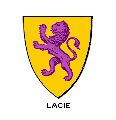
John de Lacie
was born 1192, seventh Baron of Halton Castle and hereditary
constable of Chester. The Lacie strongholds on the Welsh border
are Beeston, Chester and Halton Castles. Beeston is now a
crumbling ruin. It is hard even to identify the keep, but it
could be the large wall tower East of the gate house. The Castle
is perched on a height bounded on three sides by sheer drops,
and a steep slope on the fourth. Its strength as a defense lay
in its inaccessibility. There are two baileys, the innermost on
a summit and the other situated on the sloping ground. The inner
bailey was guarded on the approachable side by a gate house, two
wall towers and a ditch thirty-five feet wide and thirty feet
deep, which cut across the promontory. It is important to note
that the artificial ravine was fashioned two hundred fifty years
before blasting was known. The date of founding was in the 13th
Century, and it was founded by Randolph de Blondevill, Earl of
Chester.
Chester was the last
City to yield to William the Conqueror, and the surrender came
in 1070. Once the Normans had the Castle, William's nephew, Hugh
Lupus, Palatine Earl of Chester, was appointed as head of the
border patrol.
Chester Castle was
originally built by the first Norman Earl of Chester, and now
consists of modern buildings, the assize-court, jail and
barracks. The one remaining Norman relic is "Julius Caesar's
Tower," standing by the River. It is a square tower which has
been used as a powder magazine, but is scarcely recognizable as
a Norman building, because it has been recently re-cased in red
stone. With the exception of this tower, another of the round
style, and adjacent buildings in the upper ward, the Castle was
dismantled at the end of the 18th Century. From Julius Caesar's
Tower one can see the ruins of Beeston Castle, which met a like
fate in 1646. Of Halton Castle nothing is left.
Lincoln was the fourth
City of the Realm when the Normans invaded, and it seemed to
William to be a logical site for a castle. The Domesday Book
states that one hundred sixty-six houses were torn down to make
way for it. The Anglo-Saxon Chronicle held that on his return to
York in 1068, William erected the Castle on the site of a Roman
fort. Since the land was rather flat, a great bank was built up
around it. There are two motes, the larger one crowned by a
polygonal shell wall, which may have been built by Ralph de
Gernon's widow. In 1140 King Stephen captured the Castle and, in
1216, the Surety Barons had charge of it.
De Lacie was one of the
earliest Barons to take up arms at the time of Magna Charta. He
was also appointed to see that the new statutes were properly
carried into effect and observed in the counties of York and
Nottingham. He was excommunicated by the Pope. Upon the
accession of King Henry III, he joined a party of noblemen and
made a pilgrimage to the Holy Land, rendering valuable service
at the Siege of Damietta.
In 1232 Lacie was made
Earl of Lincoln and, in 1240, governor of Chester and Beeston
Castles. He died 22 July 1240, and was buried in the Cistercian
Abbey of Stanlaw in co. Chester. The monk, Matthew Paris,
records: "On the 22d day of July, in this year (1240), which was
St. Magdalen's Day, John, Earl of Lincoln, after suffering from
a long illness went the way of all flesh." His first wife was
Alice, daughter of Gilbert 'd’Aquila, but by her he had no
issue. She died in 1215 and he married second, after his marked
gallantry at the Siege of Damietta, Margaret, only daughter and
heiress of Robert de Quincey, a fellow Crusader, who died in the
Holy Land, eldest son of Saire de Quincey, the Surety. They had
three children; Lady Margaret survived him and married second
Walter Marshall, Earl of Pembroke.
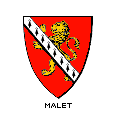
William Malet was
mentioned as a minor in the year 1194, in connection with an
expedition made that year into Normandy. His principal estate
was Curry-Malet. From 1210 to 1214 he was sheriff of counties
Somerset and Dorset. He then joined the Barons against King John
and became one of the Sureties. He had lands in four counties
which were confiscated and given to his son-in-law, Hugh de
Vivonia, Thomas Basset, and to his father-in-law, and Malet was
excommunicated by the Pope in 1216. He was also fined 2,000
marks, but the sum was not paid until after his death, and at
that time 1,000 marks were remitted, being found due to him for
military service to King John in Poitou. It is interesting to
note that there were five contemporary relatives named Malet,
all of whom held lands in England or in Jersey. William Malet
died about 1217, having married Mabel, called also Alice and
Aliva, daughter of Thomas Basset of Headington. Nothing now
remains of Malet's estate of Curry-Malet.
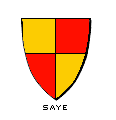
Geoffrey de Saye was
in arms with the other Barons against the King, and consequently
his extensive lands and possessions in ten counties were seized.
These were given to Peter de Crohim. Six of the counties we can
name: Northampton, Cambridge, Essex, Norfolk, Suffolk and
Lincoln, but we cannot be sure of what Castles in those areas
were Geoffrey's, or which other four counties he could claim.
While William d'Albini
and his companions were holding Rochester Castle, they had been
assured that other Baronial leaders would relieve them if the
Castle were to be besieged by King John. Such a rescue would not
have been easy unless the Royal guards were lax in watching the
bridge over the Medway. If this bridge were under guard, a march
to Rochester from London along the Dover Road would prove
impossible, the company then being forced to detour and approach
Rochester from Maidstone. Nevertheless, on 26 October, they
moved in as far as Dover, where they soon heard that the King
was on his way to meet them. They promptly returned to London,
leaving the Rochester garrison to do the best it could.
Perhaps the march on
Rochester was a sop to the Barons' consciences. Had it been a
serious move, it would have been an extraordinarily foolish one.
The only other attempt to save Rochester was negotiatory. On 9
November King John issued letters of conduct for Richard de
Clare, Robert FitzWalter, Geoffrey de Saye and the Mayor of
London, to confer with the Royal emissaries: Peter de Roches,
Hubert de Burgh and the Earls of Arundel and Warren. There is no
certainty that these men ever met. If indeed they did, nothing
came of it. We suspect that the meeting was originally planned
with the hope that a proposal would be accepted, and it is not
unlikely that the proposal would have been a willingness to
surrender Rochester Castle to the King if the garrison could go
free, but no such move resulted. Yet despite the futility of the
meeting, at least we see Geoffrey de Saye connected, if lightly,
with Rochester Castle. And this is the only Castle with which we
are able to link his name.
Geoffrey de Saye returned to
the Royalist party when the civil war was over, and sided with
King Henry III, thereby regaining his lost lands after the
expulsion of the Dauphin. He died 24 October 1230 leaving a son,
William, as his heir, by Alice, daughter of William de Cheney.
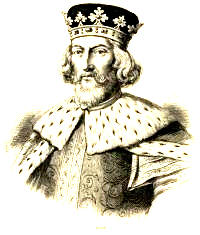 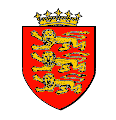
King John "Lackland" I
was born in
Beaumont Palace, Oxford, England December 24, 1167. King
of England and Ireland (1199-1216) of the house of Plantagenet,
the youngest son of King Henry II of England and Eleanor of
Aquitaine. He was often called John Lackland because Henry
provided his elder sons with dominions but granted none to
John. When Richard I, one of John's older brothers became king
in 1189, he conferred upon John earldoms which comprised nearly
a third of England. Nevertheless John attempted to seize the
crown while Richard was being held for ransom in Austria
(1192-94), where he had been imprisoned on his way back to
England from Palestine after the Third Crusade. John did not
succeed, and Richard on his return to England pardoned him and
later reputedly designated him as his successor. After
Richard's death in 1199, the legitimate heir was Arthur, son of
Geoffrey, another older brother of John; but John had himself
crowned king at Westminster in 1199, and fought in France
against Arthur and the French under King Philip II, who
supported Arthur's claim. John succeeded in capturing Arthur
and, according to tradition, had him put to death at Rouen; but
in subsequent warfare he lost to Philip the duchies of Normandy,
Touraine, Maine, Anjou, and Poitou, which John had inherited
when he became king.
John was a
cruel and tyrannical monarch, and his disregard of the rights or
claims oaf others brought him into violent conflict in domestic
affairs with the papacy, and later with the barons of England.
In 1206 John refused to accept as archbishop of Canterbury the
prelate favored by Pope Innocent III and in 1208 the pope
punished John by issuing an interdict against England. In
retaliation John confiscated the property of the clergy,
whereupon the pope deposed John and commissioned Philip of
France to carry out the execution of the deposition. John, who
was hated by his subjects, found himself without support to
fight the French king, and in 1213 to forestall a French
invasion, he yielded to the pope, agreeing to hold England as a
fief from the papacy. Although the pope no longer favored
invasion, Philip set out for England, but his fleet was defeated
by the English fleet of the Belgium coast and he did not reach
England. John in turn invaded France, but was crushingly
defeated in 1214 at Bouvines, near Lille.
The
English barons, who had long been rebellious because of John's
abuses in the administration of justice, saw in John's defeat an
opportunity to end his tyranny. On his return to England they
drew up a petition demanding the issuance by him of a charter
modeled on the charter granted by Henry I which would secure to
the subjects of the kings of England their political and
personal rights. John refused to issue such a charter and
prepared to fight the barons. Once again he found himself
without support, and when the barons raised an army and marched
on London, he submitted. On June 15, 1215, at Runnymede he
unwillingly signed the famous Magna Charta. He soon prevailed on
the pope to issue a bull annulling the charter, raised an army
of foreign mercenaries, and began a war with the barons. John
died before the war was decided. He was succeeded by his son
Henry, who ruled as Henry III.

Runnymede
Runnymede or Runnimede
(rŭn'ĭmēd)
is a water meadow, in Egham, Surrey, S England, on the south
bank of the Thames River, W of London. It was either on this
meadow or on nearby Charter Island, King John signed the Magna
Carta in 1215.
The water-meadow at
Runnymede is the most likely location at which, in 1215, King
John sealed the Magna Carta, and the charter itself indicates
Runnymede by name. It has been disputed whether the ceremony
took place actually in the meadow, or on Magna Carta Island, a
small (and now private) island in the Thames adjacent to the
meadow, or at Ankerwycke, an
ancient place adjoining Magna Carta Island on the far bank.
Although the latter two locations are now in Berkshire, they may
have been considered part of Runnymede at the time.
Twenty miles
southwest of London, Runnymede Meadow, with adjoining lands
totaling 182 acres, was presented to the National Trust by the
first Lady Fairhaven and her two sons in memory of Urban Hanlon
Broughton in 1929. The memorial to Broughton consists of the
kiosks, piers and lodges ('The Fairhaven Lodges') at the Windsor
end designed by Edwin Lutyens.
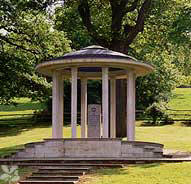
The Magna Carta Memorial at
Runnymede
Standing at the foot of the
Cooper's Hill Slopes is a memorial to the Magna Carta in the
form of a domed classical temple containing a pillar of English
granite on which is inscribed: 'To commemorate Magna Carta,
symbol of Freedom Under Law.' This was built by the American Bar
Association on land leased by the Magna Carta Trust. It was paid
for by voluntary contributions of some 9,000 American lawyers.
The memorial was designed by Sir Edward Maufe R.A. and unveiled
on 18 July 1957 at a ceremony attended by American and English
lawyers.
 |














